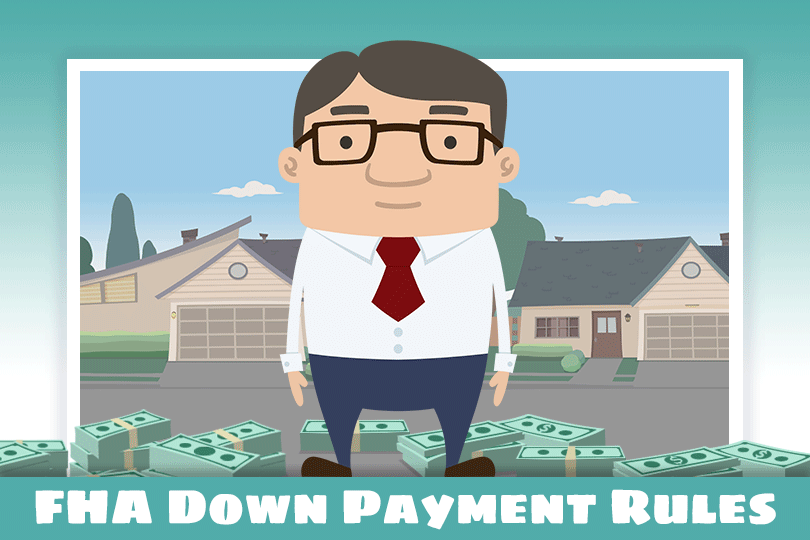Things to Know About Making an FHA Loan Down Payment
August 9, 2021
Lenders Need to Mitigate Risk
Making a sizeable down payment gives lenders peace of mind, knowing that a borrower would not part with a large amount of money if they did not intend to come through on the entire loan. Depending on the type of mortgage you apply for, the down payment requirement may vary. For most conventional loans, borrowers are generally required to pay 20% of the purchase price, whereas FHA loans have a low requirement of 3.5%. FHA-approved lenders feel more comfortable accepting this smaller amount since the loans are insured by the FHA, and the lenders are protected in the case of borrowers defaulting.
Private Mortgage Insurance
Even though most conventional loans come with the 20% minimum down payment criteria, there are borrowers who cannot meet that requirement. This does not always exclude them from being approved. In the same way the FHA charges a Mortgage Insurance Premium with their loans, conventional mortgage lenders require that any borrowers paying less than 20% toward the down payment must purchase Private Mortgage Insurance (PMI).
If you are considering a conventional mortgage, it is important that you understand how Private Mortgage Insurance works. While it helps you qualify for a loan that you could not otherwise afford, it does increase the cost of the loan itself. You can make a lower payment upfront, but the monthly PMI premium will be added into your monthly mortgage payments. Additionally, PMI does not protect you, it protects the lender from losses if you are unable to pay back the loan. In most cases, you will not have to make PMI payments for the life of the loan. Pertaining to the conventional loan, once you have built up more than 20% equity in your home, you can put in a request to have the monthly PMI charge dropped. Talk to your loan officer to make sure this is an option before you sign!
Down Payments and Interest Rates
While the amount of money you put down on a home may not affect the interest rate you receive from the lender, it does impact the amount of interest you pay over the life of the loan. Making a larger down payment means paying less in interest, since you are borrowing less money. Imagine that you are buying a $200,000-home with a down payment of $20,000. You would be paying interest on a $180,000 loan. (200,000 – 20,000). Whereas if you paid only $10,000 upfront, you’d be paying interest on a $190,000-loan instead.
Down payments are one of the most daunting factors of homebuying for many first-time buyers. Saving up such a huge chunk of funds is not always an affordable option for most people, and so they get stuck in a “renter’s trap.” While it can be a little overwhelming, it’s important for prospective homebuyers to do their research and learn about their options, including Down Payment Assistance Programs. Head to www.fha.com to for a comprehensive list of programs for each state.
------------------------------
RELATED VIDEOS:
Consider the Benefits and Risks of a Joint Loan
Borrowers Should Know About the Origination Fee
Everyone Needs to Pay Their Property Tax

FHA Loan Articles
March 11, 2025Adding a co-borrower to your FHA is a way to offset fears that you won't qualify for the mortgage on your own. An FHA loan co-borrower with a more substantial financial profile may offset the primary borrower's weaknesses, demonstrating a reduced risk to the lender. But for an FHA loan, don't assume that one borrower with good credit scores can offset one with non-qualifying scores. We ask 20 questions about co-borrowing to help you better plan for your FHA loan.
March 10, 2025Even if you aren’t considering your home loan options right this second, it’s smart to know your options if you decide to pursue a new home later. To that end, using a mortgage calculator is a smart choice for setting some basic budgeting parameters as you plan your path toward home ownership. A mortgage calculator helps you plan for future financial scenarios, such as buying new or refinancing a current home.
February 27, 2025 Buying your first home can feel overwhelming, especially when you start hearing terms like "subprime mortgages" and "FHA loans." Understanding these options is crucial for making the right decision. Subprime mortgages are designed for borrowers with less-than-perfect credit histories. This might include past issues like late payments, loan defaults, or even bankruptcy...
February 26, 2025Buying your first home can be exciting, but the mortgage process often throws a curveball of unfamiliar terms. Here are answers to common questions first-time homebuyers have about mortgage jargon and terms.
February 18, 2025Mortgages typically require mortgage insurance and homeowners insurance. They are both key parts of your home loan but they serve very different functions. Do you know the differences between the two? Find out how ready you are to begin the process of buying your new house.







